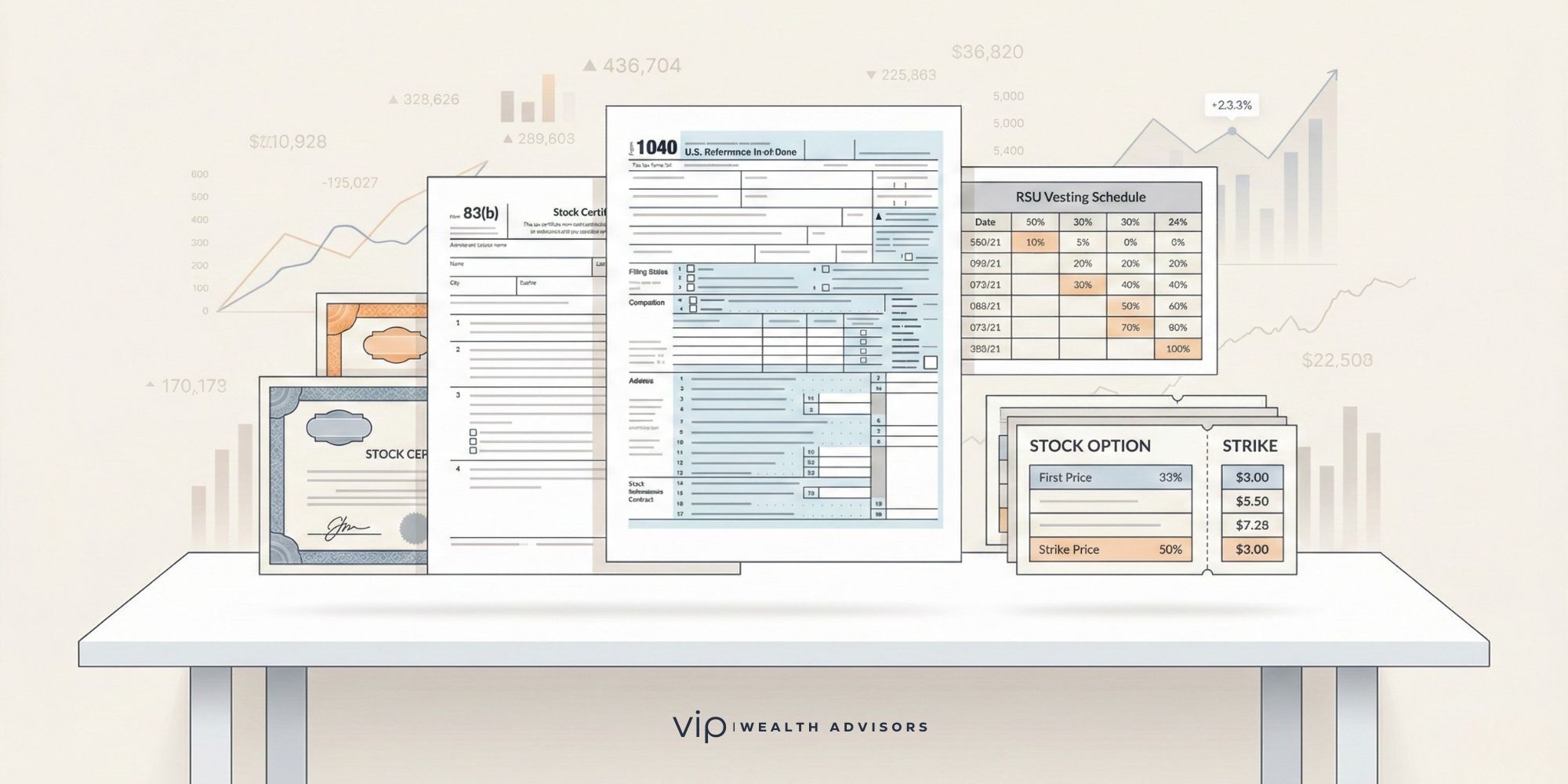The honeymoon period for crypto tax anonymity is over.
For years, digital assets lived in a gray zone, technologically advanced, yet financially underreported. Investors traded across exchanges, moved tokens between wallets, and often wondered how (or if) the IRS could ever keep track. That question is now settled: they can, and they will.
Beginning with the 2025 tax year, every major U.S. crypto platform will be required to report detailed transaction data directly to the IRS using a new information return, Form 1099-DA (Digital Assets). Those forms will start showing up in investors' inboxes in January 2026, marking one of the most significant transparency shifts since the IRS began tracking stock sales decades ago.
At VIP Wealth Advisors, we view this as more than a compliance issue; it marks the beginning of a new era for digital asset investors. Here's what you need to know to stay ahead.
Why the IRS Is Targeting Crypto Now
Crypto's rapid rise left regulators scrambling to catch up. While stockbrokers have issued 1099-B forms for years to report capital gains and losses, no such standardized system existed for digital assets. That gap resulted in billions of unreported taxable income.
A 2023 report by the Treasury Inspector General for Tax Administration estimated that as much as 75% of crypto-related income may have gone unreported. The new Form 1099-DA aims to close that gap.
This initiative stems from the Infrastructure Investment and Jobs Act (IIJA) passed in 2021, which expanded the definition of a broker to include digital asset platforms. The IRS now wants the same level of visibility into crypto transactions as it has for traditional investments, ensuring that gains, losses, and proceeds are accurately captured and reconciled against taxpayer returns.
What Exactly Is Form 1099-DA?
Form 1099-DA stands for Digital Assets Information Return. It's the IRS's new reporting tool designed to track crypto transactions with precision.
Think of it as the crypto equivalent of the 1099-B you receive from a brokerage firm like Fidelity or Schwab, but tailored for the complexities of digital assets.
- Gross proceeds from sales or exchanges of digital assets
- Cost basis (purchase price) when known
- Dates of acquisition and disposition
- Wallet addresses involved in each transaction
- Transaction identifiers and digital asset types (e.g., Bitcoin, Ethereum, NFTs)
For the first time, the IRS will receive line-by-line details of your crypto sales and transfers, including those across wallets and exchanges. The agency will automatically match this information against your tax return, just as it already does with W-2s and 1099-Bs.
Which Companies Must File Form 1099-DA
If you're wondering who will be sending out these forms, the list is long and growing.
Under the expanded "broker" definition, any platform that facilitates the sale, exchange, or transfer of digital assets for customers is required to report. That includes:
- Major exchanges: Coinbase, Kraken, Gemini, Binance.US, and Bitstamp
- Fintech and payment apps: PayPal, Venmo, Cash App, and Robinhood Crypto
- Traditional custodians expanding into crypto: Fidelity Digital Assets, Charles Schwab, and E*TRADE
- NFT marketplaces: OpenSea, Rarible, and others facilitating tokenized asset sales
- DeFi platforms (if structured as custodial intermediaries or with identifiable U.S. entities)
Even non-U.S. exchanges could be subject to these rules if they service American taxpayers or operate through U.S. subsidiaries.
In short, if you're trading crypto through any recognized platform, expect to see a 1099-DA in your inbox by early 2026.
When the Rules Take Effect
The new regulations take effect for transactions occurring on or after January 1, 2025.
That means when you file your 2025 return in early 2026, your exchange will send both you and the IRS a Form 1099-DA summarizing your digital asset activity.
For investors, this year (2025) represents the final opportunity to organize wallet records, reconcile cost basis, and clean up old transactions before automated reporting begins. Once the data pipeline is live, discrepancies between your reported gains and the exchange's numbers could trigger IRS notices or audits.
What Investors Will See on the Form
Expect your Form 1099-DA to resemble a brokerage Form 1099-B, but tailored specifically for digital assets. It will include:
- The name and address of the broker (exchange or platform)
- Your identifying information
- Each transaction's date acquired, date sold, cost basis, and proceeds
- A unique transaction ID and digital asset type
- Wallet or account identifiers for cross-reference
This added transparency will streamline reporting for many investors who have struggled to compile crypto data manually. However, it also eliminates plausible deniability for those who failed to report their activity from prior years.
Cost Basis Chaos and the Zero Dilemma
If there's one area that's guaranteed to trip up investors and advisors alike, it's cost basis reporting.
In traditional finance, transferring your stocks from Fidelity to Schwab is seamless, and your cost basis is assigned automatically. But in crypto, that infrastructure doesn't exist. Wallets, exchanges, and DeFi platforms often operate in isolation, without standardized data sharing or consistent record-keeping.
That creates a significant problem under the new Form 1099-DA regime.
Let's say you bought Ethereum in 2019 on Kraken, transferred it to Coinbase in 2021, and sold it in 2025. Because Coinbase has no record of your original purchase, it may report your cost basis as $0.
A zero basis means the IRS will see your entire sales proceeds as taxable gain, even if you actually sold at a loss. For an investor who's been trading digital assets for years across multiple platforms, that's not a rounding error; it's a potential tax disaster.
This is where proactive recordkeeping becomes critical. Without clean historical data, exchanges will err on the side of reporting zero or incomplete basis, and the burden of proof shifts entirely to you.
Inaccurate cost basis reporting can lead to inflated gains, underpayment penalties, and increased audit exposure.
How to Protect Yourself From Incorrect Cost Basis Reporting
- Use crypto tax software now to aggregate transaction history across exchanges and wallets.
- Export and save CSV files annually before platforms purge old records.
- Match transfers manually with acquisition dates and original cost.
- Reconcile all transaction data before 2025 closes.
At VIP Wealth Advisors, we're helping clients untangle years of transaction data to ensure accurate cost basis reporting before the 2026 tax season begins. For investors with six- or seven-figure crypto positions, getting this right can mean the difference between a manageable tax bill and a costly mistake.
How This Changes Tax Season for Crypto Holders
Historically, crypto investors had to self-report gains and losses using spreadsheets or third-party tracking tools. The process was cumbersome, and mistakes were easily made.
Starting in 2026, the dynamic changes completely. The IRS will automatically match the data from your Form 1099-DA against your filed return. Any mismatches, missing transactions, inconsistent cost basis, or omitted income could trigger an IRS notice.
This also means that the IRS will see every taxable event, including crypto-to-crypto trades, stablecoin swaps, and NFT sales.
For investors, this is a wake-up call: the era of crypto secrecy is over. However, for those who are proactive, it presents an opportunity to build precision into their tax strategy.
Planning Opportunities and Advisor Strategies
Investors should consider the following:
As compliance increases, so does the value of advisory integration, which connects your crypto, investment, and tax strategies under one roof.
What Happens If You Don't Report Correctly
Failure to report accurately, or at all, under the new regime could trigger penalties. The IRS has already increased enforcement funding and has begun using advanced analytics to flag crypto discrepancies.
Underreporting income, misreporting basis, or failing to include transactions listed on a 1099-DA could result in:
- Accuracy-related penalties (typically 20% of the underpayment)
- Failure-to-file or failure-to-pay penalties
- Audit exposure or IRS CP2000 notices
Because every 1099-DA will also be sent to the IRS, the agency will automatically cross-check your return against the information provided. If your numbers don't match, expect a letter.
The VIP Wealth Perspective
While these new rules may sound daunting, they also represent progress. Transparent reporting will legitimize crypto as an investable asset class, enabling more precise tax planning and portfolio integration.
At VIP Wealth Advisors, we're already helping clients map digital asset transactions into their broader financial plans, from integrating wallet data to managing liquidity events and long-term tax efficiency.
Our goal is simple: ensure that compliance doesn't become chaos, and that you turn this regulatory change into a strategic advantage.
The Bottom Line
Crypto investing is evolving, and so is how it's taxed.
With Form 1099-DA, the IRS isn't simply enforcing compliance; it's signaling that digital assets have become a mainstream part of the financial system. For investors, this means accountability, as well as opportunity.
By staying organized, tracking your basis accurately, and working with a tax-integrated advisory firm, you can stay one step ahead of the IRS while optimizing your after-tax returns.
At VIP Wealth Advisors, we help clients strategically, proactively, and confidently embrace the new era of crypto transparency.
Your Crypto 1099-DA Questions Answered
+What is Form 1099-DA?
Form 1099-DA is a new IRS information return that reports crypto and digital asset transactions, including proceeds, cost basis, and wallet details. Exchanges and platforms must send it to both you and the IRS starting in 2026 for transactions from 2025.
+When will I receive my first Form 1099-DA?
You'll receive your first Form 1099-DA in January 2026, covering all digital asset sales or exchanges made in 2025.
+Which companies will issue Form 1099-DA?
Platforms like Coinbase, Kraken, Gemini, Binance.US, PayPal, Venmo, Cash App, Robinhood, and OpenSea are expected to issue Form 1099-DAs to their users.
+What information will the form include?
Each form will show your crypto sales proceeds, cost basis (if known), acquisition and sale dates, and wallet or transaction identifiers.
+Will the IRS be aware of my cryptocurrency transactions?
Yes. Form 1099-DA creates a direct data pipeline between exchanges and the IRS. The agency will automatically match that information to your tax return.
+What if I only moved crypto between my own wallets?
Transfers between wallets you own aren't taxable, but brokers must still report them. You'll need to clearly identify these internal transfers when filing to avoid mismatches.
+Do I owe taxes on crypto I didn't sell?
No. Holding crypto is not a taxable event. Taxes apply when you sell, exchange, or use crypto to buy goods or services.
+How should I prepare now?
Start consolidating your transaction data and cost basis records. If you've used multiple exchanges or wallets, reconcile all transactions before the end of 2025 to ensure a smooth transition when reporting begins.
+What's the penalty for not reporting crypto income?
Failing to report income shown on a 1099-DA can result in penalties, interest, and possible IRS notices. Intentional underreporting could escalate to civil or criminal penalties.
+How can an advisor help?
A qualified advisor integrates your crypto reporting into your broader financial plan, aligning it with tax strategy, liquidity needs, and long-term investment goals. VIP Wealth Advisors can help ensure you're not just compliant, but optimized.
Need help preparing for Form 1099-DA?
Crypto taxes are getting more complicated, but you don't have to navigate them alone. Let's build a proactive plan that keeps you compliant and optimizes your after-tax returns.
View More Articles by Topic
- Taxes (81)
- Financial Planning (46)
- Equity Compensation (38)
- Investments (30)
- RSU (23)
- Tax Policy & Legislation (19)
- Business Owner Planning (17)
- Incentive Stock Options (16)
- Retirement (16)
- Psychology of Money (15)
- Alternative Investments (13)
- AMT (9)
- Pre-IPO Planning (9)
- Real Estate (9)
- Estate Planning (8)
- Fiduciary Standard (8)
- Crypto (6)
- NSOs (6)
- The Boring Investment Strategy (6)
- Capital Gains Tax (5)
- Private Investments (5)
- QSBS (5)
- Market Insights (4)
- Post-IPO Tax Strategy (4)
- 401(k) Strategy (3)
- Market Timing (3)
- Q&A (3)
- Stock Market (3)
- Venture Capital (3)
- Altruist (2)
- Charitable Giving (2)
- ETF Taxes (2)
- IRA Strategy (2)
- International Financial Strategies (2)
- Irrevocable Trust (2)
- Legacy Wealth (2)
- Video (2)
- AUM vs Flat Fee (1)
- Atlanta (1)
- Book Review (1)
- Carried Interest Planning (1)
- Depreciation & Deductions (1)
- Education Planning (1)
- Energy Markets (1)
- Precious Metals (1)
- QTIP Trust (1)
- Revocable Trust (1)
- Risk Management (1)
- Schwab (1)
- Solo 401k (1)







